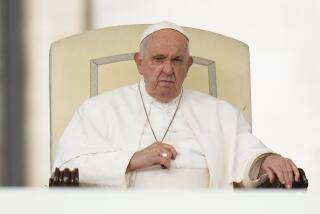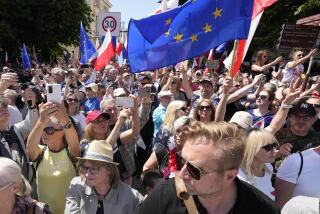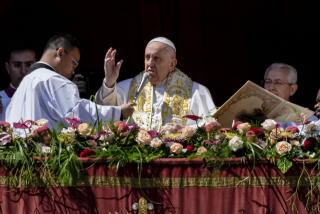Pope Warns Poles Not to Work ‘Against Christ’
- Share via
WROCLAW, Poland — Pope John Paul II, struggling to boost the Roman Catholic Church’s declining authority in his native Poland, warned his compatriots Sunday that they cannot build a free post-Communist order “without Christ or against Christ.”
“Attempts are being made to convince man and whole societies that God is an obstacle on the path to full freedom, that the church is the enemy of freedom, that she does not understand freedom, that she is afraid of it,” the pope told 200,000 worshipers at an outdoor Mass here.
“This is an unprecedented falsification!” he said, raising his voice to a shout and drawing applause from the rain-soaked crowd. “Especially in this country, on this land . . . where the church has proven many times to be a guardian of freedom.”
The sternly defensive homily came on the first full day of a long-awaited papal pilgrimage--one that seems timed to help the church rebound from a string of political defeats in a nation sharply divided between Catholic believers and nonbelievers.
This is Karol Wojtyla’s seventh homecoming since he left to become pope 19 years ago but his first extensive one since 1991. That visit celebrated the fall of the Soviet-backed regime that had been undermined by his stirring appearances in 1979 and 1983.
Perhaps because he is ailing and may not be able to return again, or perhaps because the church has lost so much ground during his absence, this trip home is also the longest of his papacy, with stops in 12 cities over 11 days.
The church has long been a pillar in mostly Catholic Poland, helping the Solidarity labor movement in its rise to power. But church influence has waned in recent years as many Poles grew resentful of clerical politicking, especially in the country’s bitter debate over abortion.
Polish voters in 1993 elected a leftist government that last year liberalized Solidarity’s strict anti-abortion law--although the Polish Constitutional Tribunal struck down major provisions of the liberalized law last week. A week ago, voters narrowly adopted a post-Communist Constitution that some Catholic bishops opposed as too sectarian.
John Paul’s message Sunday was aimed at politicians and commentators who have seized on the church’s setbacks.
Arriving here Saturday, John Paul made it clear that this is not just a nostalgic tour but a mission to speak out forcefully on issues in his homeland.
Poland’s problems must be solved, he insisted, “with respect for the rights of each human being, especially the most defenseless and weak”--a reference to abortion that Vatican officials say the pope will expand upon later in the trip.
John Paul hoped that, after communism fell, newly freed East European countries would be a spiritual counterweight to the West. Instead, he has watched in dismay as Poles and others have forsaken Catholic teaching in favor of what he considers loose morals and vacuous Western consumerism.
“What kind of order are we talking about here?” he demanded in his homily. “When there is a void in the area of values--when chaos and confusion reign in the moral sphere--freedom dies; man is reduced from freedom to slavery, becoming a slave to passions and pseudo-values.”
Several acres of worshipers stood before him in a muddy park and along side streets beyond his view, lifting banners of warm welcome and umbrellas against the cold drizzle.
“The presence of so many of us on this spot shows how much we need the pope again and are willing to listen to him,” said Zbigniew Karnecki, a composer.
Not all believers welcomed the pope’s message, which took issue with Catholic conservatives by endorsing Poland’s aspirations to join the North Atlantic Treaty Organization and the European Union.
Pleased by this stand, President Aleksander Kwasniewski, a Communist-turned-social democrat, emphasized John Paul’s role as a healing figure.
“We were moved to watch Beirut and Sarajevo,” he told John Paul here Saturday, referring to the pontiff’s trips this spring to those war-shattered capitals. “We Poles also need today bridges that will lead us to each other and not walls that divide us.”
More to Read
Sign up for Essential California
The most important California stories and recommendations in your inbox every morning.
You may occasionally receive promotional content from the Los Angeles Times.










